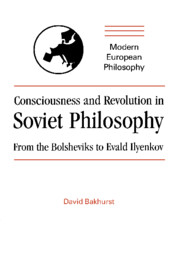Book contents
- Frontmatter
- Contents
- Acknowledgments
- A note on translation, transliteration, and references
- 1 Introduction
- 2 Deborinites, Mechanists, and Bolshevizers
- 3 Vygotsky
- 4 Lenin and the Leninist stage in Soviet philosophy
- 5 Ilyenkov and dialectical method
- 6 The problem of the ideal
- 7 The socially constituted individual: Rethinking thought
- 8 In conclusion
- References
- Index
2 - Deborinites, Mechanists, and Bolshevizers
Published online by Cambridge University Press: 10 December 2009
- Frontmatter
- Contents
- Acknowledgments
- A note on translation, transliteration, and references
- 1 Introduction
- 2 Deborinites, Mechanists, and Bolshevizers
- 3 Vygotsky
- 4 Lenin and the Leninist stage in Soviet philosophy
- 5 Ilyenkov and dialectical method
- 6 The problem of the ideal
- 7 The socially constituted individual: Rethinking thought
- 8 In conclusion
- References
- Index
Summary
In Chapter 1, I suggested that Ilyenkov's contribution may appeal to those philosophers of the Anglo–American tradition who share his hostility to the “logic of empiricism.” However, as we saw, the roots of Ilyenkov's philosophy lie deep in a terrain very foreign to the “analytic” tradition: Soviet dialectical materialism. For Ilyenkov, to be a dialectical materialist is to hold that a scientific understanding of reality can be attained only through the materialist transformation of Hegel's dialectic. Accordingly, he vehemently denied the “positivist” principle that the natural sciences alone can give a complete account of objective reality.
Ilyenkov was not the first Soviet Marxist to champion what he thought was true dialectical materialism against a scientism deemed theoretically disastrous and socially pernicious. Nor was he the first to find sustained opposition to his views from within Soviet philosophy itself. Debates between dialectical and positivist versions of Marxism, each laying claim to orthodoxy, have a long history in Soviet thought. This chapter takes us back to the birth of Soviet philosophy in the 1920s, to the first and most famous of these debates: the Deborinite–Mechanist controversy.
The influence of this controversy on the course of Soviet philosophy is often underestimated or misconstrued. While the Soviets themselves now rarely refer to it, Western commentators are usually preoccupied with the debate's historical significance as the prelude to the rise of the “Bolshevizers,” who formed the “new philosophical leadership” under Stalin. In consequence, the philosophical substance of the Deborinite–Mechanist controversy is usually given only a supporting role in a primarily political drama.
- Type
- Chapter
- Information
- Consciousness and Revolution in Soviet PhilosophyFrom the Bolsheviks to Evald Ilyenkov, pp. 25 - 58Publisher: Cambridge University PressPrint publication year: 1991



